|
Click pictures for a larger version.
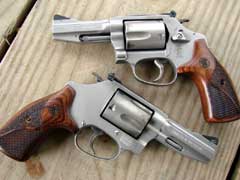
The guns appear to be the same, but the bottom gun
is much more accurate, with a tighter barrel/cylinder
gap.
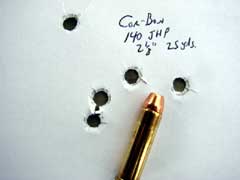
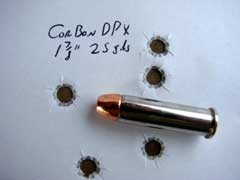
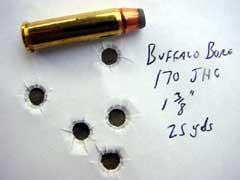
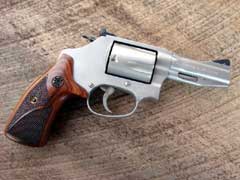
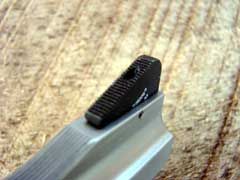
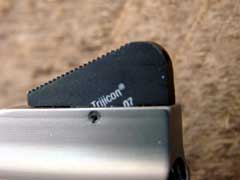
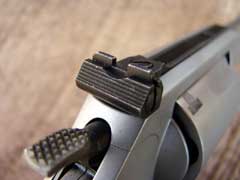
Night sights are a very valuable addition to any
fighting handgun, and S&W did not neglect this on
the Model 60 Pro.
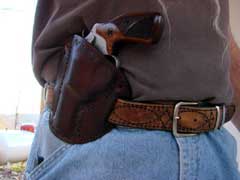
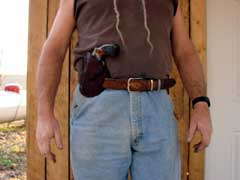
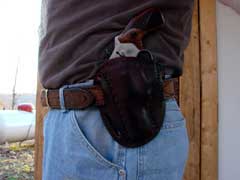
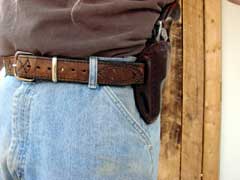
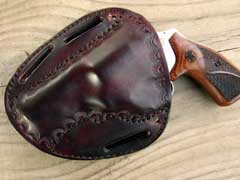
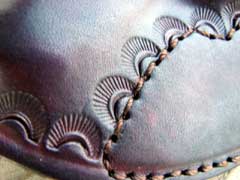
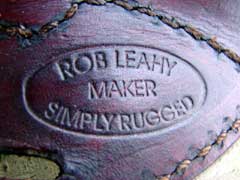
Simply Rugged Pancake holster is a fine choice for
a variety of carry positions.
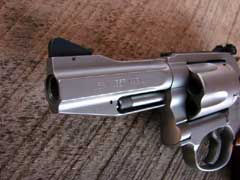
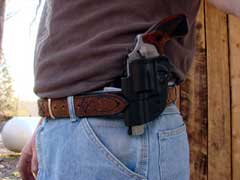
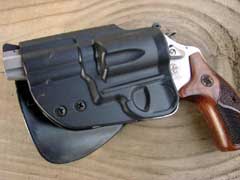
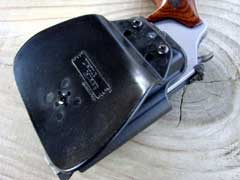
An inexpensive, but less concealable, alternative
is Uncle Mike's Kydex Paddle holster.
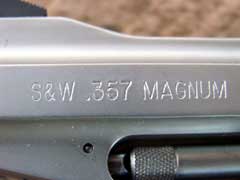
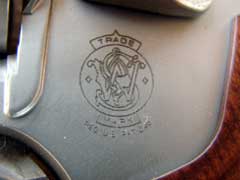
|
|
UPDATE! April 23rd, 2008
With the accuracy of the Model 60 Pro not quite
living up to my expectations as a good, all-around trail gun, I
wanted to try another sample. The adjustable sights and three
inch barrel had me filled with hopes that the Model 60 Pro would
be more than just a good self defense weapon for those
unpleasant up-close-and-personal social situations, so I put in
a call to Smith & Wesson, and they pulled another gun out of
the vault and sent it to me. I am happy to report that this
Model 60 Pro is a fine-shooting little .357 Magnum trail gun. It
displayed accuracy that is good enough to head-shoot a rabbit or
squirrel out to thirty yards or so, depending upon the skill of
the shooter. I tested the latest sample Model 60 with several of
the same factory loads as I put through the earlier gun, and the
newer one grouped much better. Factory ammo that grouped between
four and five inches in the previous test gun grouped under two
inches in the newest sample. The earlier gun had a
barrel/cylinder gap of .008 inch, and the newer one has a b/c
gap of .006 inch, and it does not spit out the gap as the
earlier gun sometimes did. S&W states that anything between
.005 and .01 is within specs, but tighter is better. Most
importantly, the newer gun is accurate. It is accurate enough to
do double duty as a defensive weapon, and as a trail gun,
combining good accuracy with the power of the .357 Magnum. I am
well-pleased with the latest test gun. It lives up to what I
have come to expect from Smith & Wesson.
Jeff Quinn
  
Smith & Wesson’s Model 60 has been
around for a few decades now, and has gradually evolved from a
stainless steel five-shot snub-nosed .38 Special with a cult
following into a compact .357 Magnum. About three years ago, I
reviewed their five inch barreled
version. It was a very good little compact hunting gun,
somewhat of a “Kit Gun” on steroids., and has since proven
to be a very useful little revolver. This newest of the Model 60
family, dubbed the Model 60 Pro, wears adjustable sights and a
three inch barrel, with a shroud that is scalloped to reduce
weight. Thankfully, the sights are black, and the serrated front
ramp is a Trijicon unit with a tritium insert for better low-light
visibility. The rear sight is the classic S&W
adjustable unit, which is both sturdy and reliable. I like
adjustable sights on a handgun, as they add greatly to the
versatility of the weapon, allowing a great latitude of load
choices.
The Model 60 pro has a well-checkered hammer for
easy cocking for single action fire, and a wide, smooth trigger
for quick, comfortable double action work. The trigger pull
measured ten and three-quarters pounds in double action mode,
and just over three pounds, six ounces in single action mode.
The double action pull was very smooth on the sample revolver,
and the single action released crisply, as I have come to expect
from Smith & Wesson.
The grips on the Model 60 Pro are the
best-looking and most comfortable that I have ever seen on a J-frame
S&W revolver. They fit my hand perfectly, and really helped
to control the weapon while firing stout high-performance Cor-Bon
and Buffalo Bore .357 Magnum ammunition. The ejector rod
stroke on the Model 60 Pro measures about 1.15 inches, and
worked well in fully ejecting fired cases. The Model 60 Pro
weighed in at 22.6 ounces unloaded, and is a relatively light,
handy little revolver. The entire stainless steel frame and
cylinder are finished in a bead-blasted satin appearance, which
is both good-looking and practical. I find a three-inch steel
revolver a bit heavy for pocket carry, preferring a lightweight
aluminum alloy revolver for such, but the Model 60 Pro carries
very well in a compact belt holster. I carried the revolver in
both a Simply Rugged Pancake leather holster and in an Uncle
Mike’s Kydex paddle holster. For concealed carry, the
Simply Rugged holster offers a lot of versatility, allowing for
high and tight strong side carry for comfortable packing
concealed, or as a cross draw holster while riding in a vehicle.
The Uncle Mike’s holster is a good choice for an inexpensive
unit to quickly clip on for range work or for a quick trip down
to the local Stop-N-Rob for a late-night purchase.
In a good holster, the Model 60 Pro rides very comfortably, and
carries five rounds of .357 magnum ammunition.
Velocities out of the little three inch Model 60
were recorded with a PACT Professional chronograph, with
the electronic eyes set at ten feet from the muzzle. The air
temperature hovered around the fifty degree mark during testing.
Velocity readings are listed in feet per second (FPS). Bullet
weights are listed in grains. JHP is a jacketed hollowpoint
bullet with a lead core. HC is a hard cast lead LBT type bullet.
DPX is a Cor-Bon load using the Barnes XPB bullet, which
is an all-copper bullet with a huge hollow nose. PB is a Cor-Bon
PowRBall load that uses a polymer ball loaded into a
jacketed hollow nose bullet to promote expansion.
| Ammunition |
Bullet Weight |
Velocity |
| Cor-Bon HC |
200 |
998 |
| Cor-Bon JHP |
140 |
1298.1 |
| Cor-Bon DPX |
125 |
1247.8 |
| Cor-Bon PB |
100 |
1545.2 |
| Buffalo Bore HC |
180 |
1256.6 |
| Buffalo Bore JHP |
158 |
1277 |
| Handload JHP |
158 |
1126.3 |
| Handload Mt. Baldy Keith |
173 |
823.6 |
| Handload XPB |
140 |
898 |
All of the high performance ammunition turned in
respectable velocities. I tried a few handloads in an attempt to
get some good accuracy out of the Model 60 Pro. Accuracy was
plenty good for social work, but was not up to my expectations
based upon my experience with other .357 Magnum S&W
revolvers. Accuracy testing was done at a distance of 25 yards
with the revolver locked securely into my Ransom
Master Series machine rest. Accuracy with most loads
would group five rounds into between three and four inches, with
two of my handloads grouping into just over two and one-half
inches. A couple of the factory loads would do no better than
five inches. Carefully selecting ammunition would result in a
handgun that is very capable as a defensive revolver at close
range, but with the Model 60 Pro coming equipped with adjustable
sights, I had fashioned this little .357 to be a good, handy
trail gun, used for the occasional rabbit or squirrel, or even
to drop a deer at close range. With the accuracy displayed by
the sample gun, small game and deer would be out of reach if
over just a few yards away. While the overall fit and finish on
the Model 60 Pro was excellent, the barrel/cylinder gap measured
eight one-thousandths of an inch (.008"), which to me is
excessive. It is within S&W specs, but I would prefer a
barrel/cylinder gap of about half that. A tighter gap spits less
burned powder, increases velocities, and usually enhances
accuracy. That is why I always look for a tight gap when
shopping for used guns. For a revolver used strictly for social
work, a two inch barrel with fixed sights, such as the S&W
Model 342PD I carry daily as my preferred pocket
gun, is adequate. That is why I had high hopes that the three
inch Model 60 would be a tack driver, as was the five inch
version tested in 2005. As is, the accuracy exhibited by the
test gun rules it out as an all-around “Kit Gun”, but it is
still a very good choice for home defense as a bedside weapon,
or carried concealed in a good holster. Depending upon your
intended use for the gun, the Model 60 Pro .357 Magnum could be
a good choice, and perhaps I was expecting the gun to be
something which it is not. The revolver’s all-stainless
construction makes controlling the weapon under recoil much
easier than with one of the ultra-light revolvers, and it should
prove durable for extended use. The grip is very comfortable in
my hand, and the excellent sights are easy to see, with the
tritium front sight especially appreciated at night.
For a detailed look at the entire line of Smith
& Wesson handguns, rifles, and shotguns, go to www.smith-wesson.com.
For the location of a Smith & Wesson dealer
near you, click on the DEALER FINDER at www.lipseys.com.
To order the Model 60 online, go to www.galleryofguns.com.
To order one of Rob Leahy’s Simply Rugged
holsters, go to www.simplyrugged.com.
To order the high performance ammunition listed
here, go to www.buffalobore.com
and www.cor-bon.com.
Jeff Quinn
  
Got something to say about this article?
Want to agree (or disagree) with it? Click the following link to
go to the GUNBlast Feedback Page.
|
|
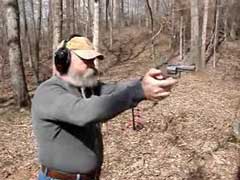
Click for video! (2008
- WMV format, 3.60 MB)
Click pictures for a larger version.
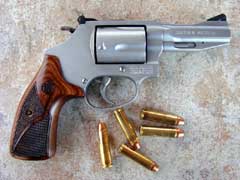
Smith & Wesson 3 Inch Model 60 Pro .357 Magnum
Revolver.
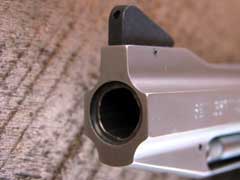
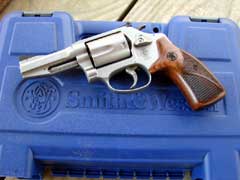
Gun comes with a hard plastic case.
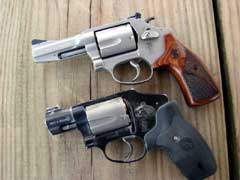
Model 60 Pro (top) compared to Jeff's Model 342PD.
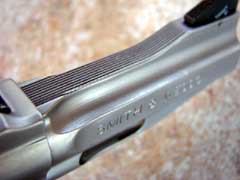
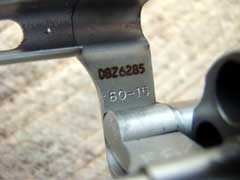
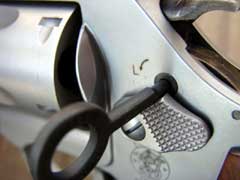
S&W's key locking system.
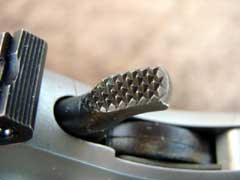
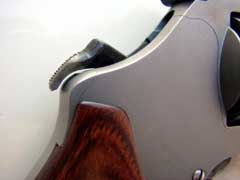
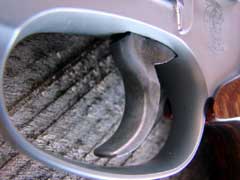
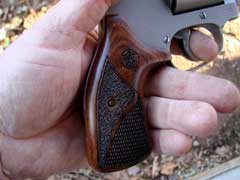
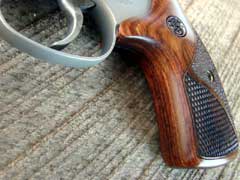
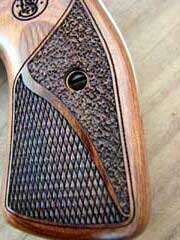
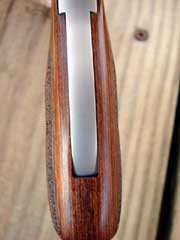
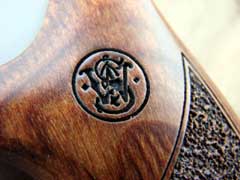
The Model 60 Pro's wood grips are the best Jeff
has ever felt for a J-Frame revolver.
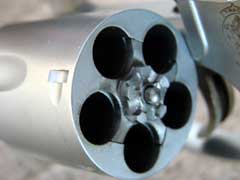
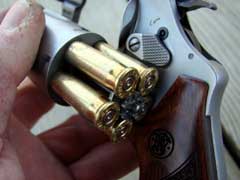
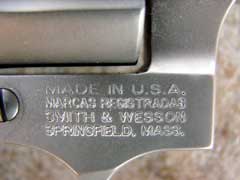
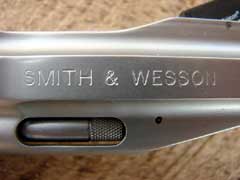
|
![]()